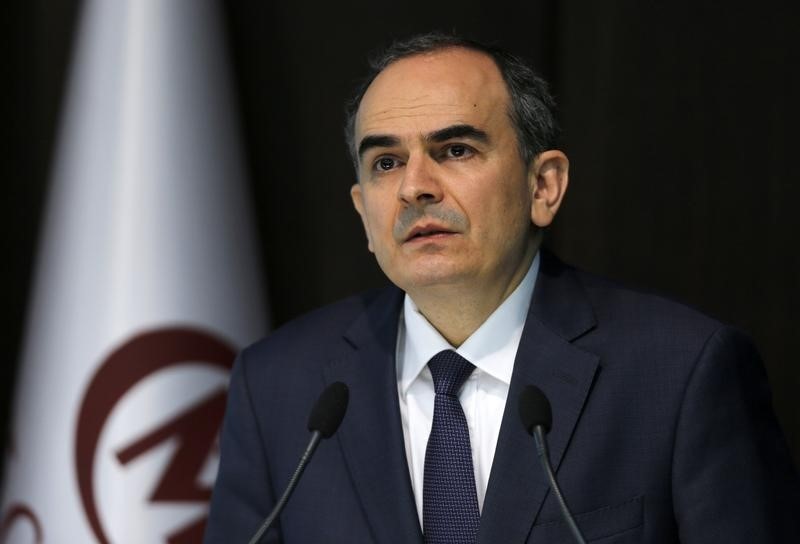By Daren Butler
ISTANBUL (Reuters) - Nervous Turkish markets are hoping President Tayyip Erdogan can make peace with the central bank governor on Wednesday, but the two seem likely at best to agree to disagree on interest rate policy.
Erdogan's demands for a sharp rate cut to boost economic growth before a June election, even though inflation remains high, have helped to send the lira to record lows and raised concern about the bank's independence.
Unable to raise rates to defend the Turkish currency, Governor Erdem Basci has resorted to tweaking policy on the margins to try to boost dollar liquidity, with limited success.
Basci and Deputy Prime Minister Ali Babacan, in charge of the economy and a staunch defender of the central bank, are due to meet Erdogan later on Wednesday. Erdogan has said both of them need to "shape up" and has denounced defenders of high interest rates as "traitors", suggesting the chances of forging any common understanding are slim.
"When Erdogan finally meets Basci, Babacan et al, he needs to signal some kind of peace has been called, and let them get on with their jobs," said Timothy Ash, head of emerging markets research at Standard Bank in London.
"Confirming Basci in office for another term would go some way to easing market concern, albeit (I'm) not sure whether Basci would want another term in this environment."
Sentiment towards the lira was boosted on Wednesday by data showing a lower-than-expected current account deficit in January, lifting it to 2.6250 against the dollar by 1130 GMT from Friday's all-time low of 2.6470.
Turkey relies on foreign capital inflows to finance the deficit, its economic Achilles heel, leaving it particularly vulnerable when overseas investors pull back.
"As we speak we have been taking profit quite actively in the run-up to the elections and political temperatures have risen," said Anthony Cragg, Emerging Markets Senior Portfolio Manager at Wells Fargo Asset Management.
"The concern out there, which is not unique to us, is of government interference particularly in monetary policy. It looks like the president is leaning on the central bank to cut rates at a time when they should not be cutting," he said. "For now that's enough to worry investors."
WORRIES ON THE STREET
Basci, a former professor respected for his command of economic theory, is unlikely to yield to the sort of rate cuts Erdogan wants, particularly with inflation running well above the bank's 5 percent target.
But Erdogan is wedded to the idea that high rates cause high inflation, and his assaults on the central bank go down well with industrialists who have grown rich during his time in power and have been among the guarantors of more than a decade of electoral success.
The weakness of the lira, which is down around 12 percent against the dollar this year, is however starting to hit ordinary Turks in the pocket, something the ruling AK Party will be keen to avoid as the parliamentary election approaches.
"Obviously we're feeling it... the local merchants follow the lira very closely and put their prices up. Everyone is doing it," said retired businesswoman Nesrin, 55, shopping with her daughter-in-law on one of Ankara's main commercial streets.
Another Deputy Prime Minister, Numan Kurtulmus, tried to calm such worries on Wednesday, telling reporters that the Turkish economy was "extremely well prepared for volatility".
Basci, Prime Minister Ahmet Davutoglu and cabinet ministers held an eight-hour meeting on the economy on Tuesday, after which the government promised measures to boost industrial production and employment as it seeks to accelerate growth.
In a statement it also stressed the central bank's independence and said the bank was taking the necessary steps.
The bank said on Tuesday it would adjust its reserve requirements - used to control the amount of dollars in the market - to boost foreign exchange liquidity temporarily by about $1.5 billion over the next few weeks.
Turkish shares and bonds rebounded with the lira. The main stock index, which tumbled 3.3 percent on Tuesday, was up 0.6 percent. The benchmark 10-year government bond yield fell to 8.33 percent from 8.39 percent on Tuesday.

The cost of insuring exposure to Turkish debt edged back from 11-month highs, with Turkey's 5-year credit default swaps (CDS) dipping to 224 basis points from a close of 227, according to data from Markit.